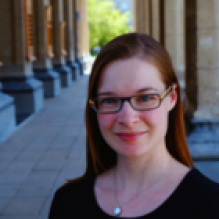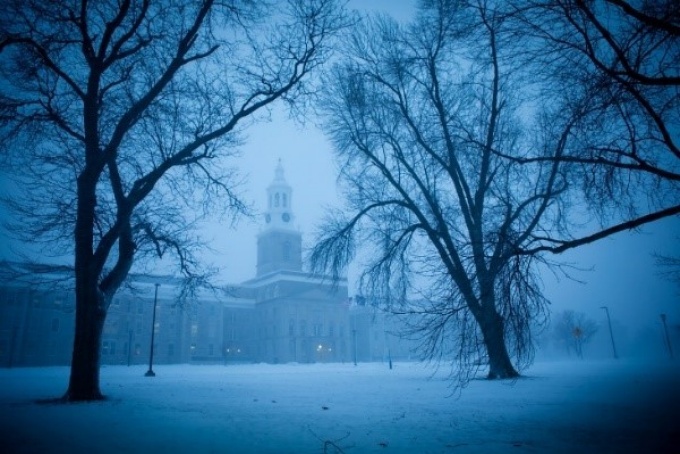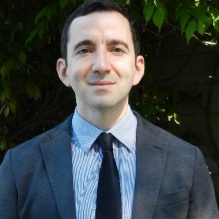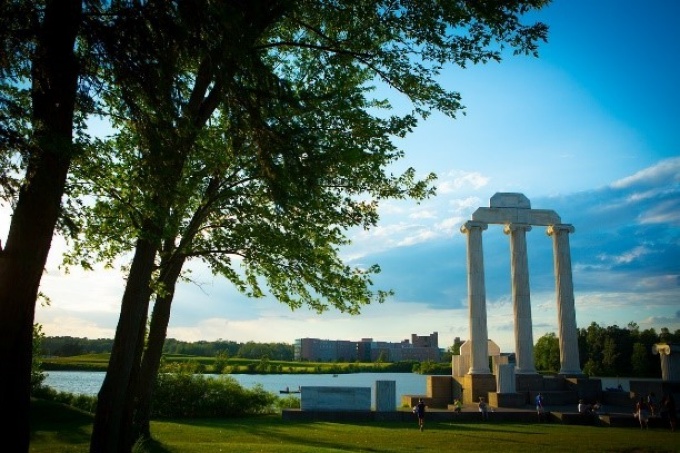Meet Our New Faculty Members

Assistant Professor Katherine Zubovich
Please tell me a bit about your specialization and background in history.
I'm a specialist in Russian history and have a focus on the Soviet period in my research, but I teach into earlier periods such as Kievan Rus and Muscovy. I was a history major and an art history major during undergrad so that's where my background begins in the field. I did my undergrad at University of Victoria in Canada. While there, I also took classes in Russian language and Russian art history, and that's what got me into Russian history. I went to the University of Toronto and did a master's degree, and then went on to do a PhD at Berkeley in California. My research focuses on the Soviet Union, urban history, and architectural history.
Are you working on any projects right now, or have you recently completed anything you would like to tell us about?
I'm just finishing up turning my dissertation into a book. It's about Soviet skyscraper building in the Stalin-era. I'm looking at the construction after World War II of skyscrapers in the city of Moscow and the transformation of Moscow into this showcase socialist city in the post war period. (This book is due out in December.)
What classes are you teaching this semester at UB and do you have any ideas for future classes?
This semester I am teaching an Imperial Russia class as well as a course on Russia and the West. This spring I'll be teaching an undergraduate course on Stalinism and a graduate course that deals with the historiography of Russia and Eastern Europe. In the future I’d like to teach a Soviet history survey of course. I’d also love to teach in the area of urban history. There's also Russian language classes offered at UB, and a number of my students this semester have told me about an exchange to Russia that they've gone on, so I'd also love to partner with the folks who are teaching about Russia in other capacities at UB.

As you are new to the Buffalo area, what has been the most interesting thing so far about your time in the city?
I've been really excited by how green the city is. We moved down here from Toronto, which is a green city in its own way, but doesn’t have quite the same amazing green spaces such as the boulevards. As somebody interested in urban planning and architecture, Buffalo’s a pretty cool city especially with its amazing City Hall that actually has a resemblance to the skyscrapers I talk about in my book. The greenness of the city is great and there are very cool areas to go hiking and get outdoors around Buffalo. I'm looking forward to trying out cross country skiing this winter and trying to embrace winter sports.
Is there something you would like to share about yourself that we would not know from reading your CV?
One of most interesting exchanges I went on as a student was to Kyrgyzstan during the first summer of my PhD. I was initially thinking I would do a project on Central Asia and of course that doesn’t really appear anywhere on my CV because I didn't end up going in that direction with the research. But I did end up spending two months in the capital of Kyrgyzstan, Bishkek, and it was really fascinating. It was a really, really, interesting city and a super interesting place to be because at that moment Bishkek was serving as one of main bases and jumping off points for the US during the War in Afghanistan. I was very surprised to find that the city was actually full of Americans and it was an interesting place to be. It was the sort of place that feels very remote and very kind of out there and certainly very far from Moscow, but I actually had this kind of connection as I was coming from and living in the US at the time.
Closing Comments from Katherine:
I am really excited to be here. I'm so thrilled to be joining this department. So far everybody is just so lovely and great, the students are great. The university is great. I am just really excited to be here!

Professor Gene Zubovich
Please tell me a bit about your interests and your background in history.
I received my PhD from the University of California, Berkeley in 2015. I taught there for a year, followed by a string of postdocs at Washington University, University of Toronto, and most recently I was an assistant professor at Mississippi State University before coming to UB. I'm a historian of the United States. I was trained in intellectual history, but I specialize in US and the world. In all my writing and teaching, my focus has been on the history of religion and the history of human rights within the US and the world.
What projects are you working on right now?
I am just finishing up my first book which is called The Global Gospel: Protestants, Human Rights, and the Fracturing of the Twentieth-Century United States (forthcoming with the University of Pennsylvania Press). In the broadest terms it’s a history of how international human rights ideas came to transform American domestic politics. I tell the story through religious communities by looking specifically at liberal Protestants. Today, we think of evangelicals playing a really important role in religion and politics but in the 20th century it was really liberal Protestants that were the most active and engaged politically. They helped shape the United Nations; they helped write the Universal Declaration of Human Rights; they fought segregation, poverty, and sought to transform American foreign policy.
I'm also a really excited to have won a Kluge fellowship at the Library of Congress to start research on my second book project which is a global history of the American culture wars. Instead of looking at how international human rights transformed domestic politics, it looks at how Americans exported the culture wars abroad to places like sub-Saharan Africa, Eastern Europe, and Russia. I’m excited about getting started on it!

What classes are you teaching at UB?
I am excited to have already started teaching. I'm really thrilled with the caliber of the students here. They are smart and engaged and generally impressive. Right now, I'm teaching a graduate course on the history of the US in the world, and I'm teaching a course on the history of human rights and humanitarianism. I'm excited to bring my own research interest into the classroom. I've started doing that with human rights and humanitarianism. I'm also thrilled to be teaching a seminar on the American culture wars next semester.
Tell me something you would like to share about yourself that we wouldn’t know by reading your CV.
I came to the United States as a refugee, and one of the reasons I got so interested in the history of human rights and humanitarianism is because of my own personal experience. I'm a refugee from the former Soviet Union and my interest in a lot of the topics I study was born out of that experience.